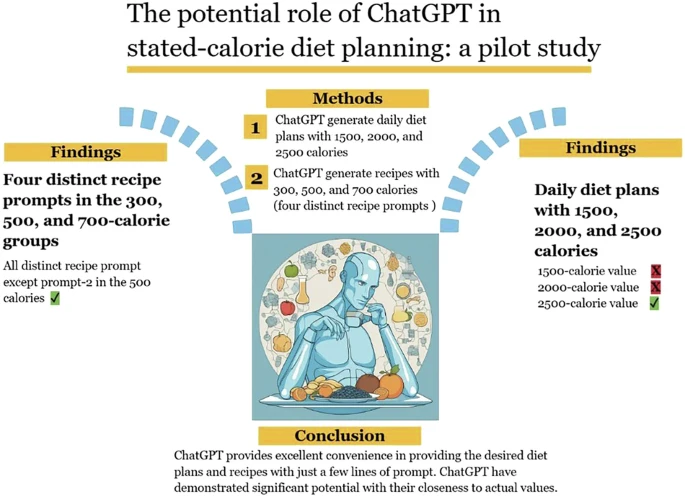Developer Offer
Try ImaginePro API with 50 Free Credits
Build and ship AI-powered visuals with Midjourney, Flux, and more — free credits refresh every month.
Can ChatGPT Accurately Plan Your Diet
The Rise of AI in Nutrition
As artificial intelligence becomes more integrated into our lives, people are increasingly turning to it for advice on complex topics, including health and nutrition. However, there's a lack of scientific research validating the reliability of AI-generated dietary recommendations. This prompted a pilot study to investigate a key question: Can ChatGPT accurately plan meals and daily diets to a specified calorie count?
Putting ChatGPT to the Test
Researchers used the freely available ChatGPT version 3.5 for their experiment. The AI was given two main tasks:
- Generate individual recipes targeted at 300, 500, and 700 calories.
- Create full-day diet plans targeted at 1500, 2000, and 2500 calories.
To ensure a fair test, four different prompts were used for each recipe category. After ChatGPT generated the recipes and meal plans, the researchers meticulously calculated the actual calorie content of each one using established professional nutrition databases. This allowed for a direct comparison between the requested calories and the actual calories provided by the AI.

Analyzing the Caloric Accuracy
The results were promising, particularly for individual recipes. Across the 300, 500, and 700-calorie recipe groups, there was generally no significant statistical difference between the target calories and the actual calories. The AI was quite adept at creating single dishes that met the specified energy value.
When it came to the more complex task of daily diet planning, the performance was more varied. The study found that for the 2500-calorie daily plans, ChatGPT's output was impressively accurate, showing no significant difference from the target.
The Verdict Is ChatGPT a Reliable Diet Planner
Based on these findings, the study concludes that ChatGPT is currently more successful at creating calorie-specific recipes than it is at planning entire daily diets. The closeness of the generated calorie values to the actual values demonstrates significant potential for AI in this field.
However, the researchers stress that this is just one piece of the puzzle. Further studies are crucial to evaluate the broader reliability of ChatGPT. Future research must look beyond just calories to assess the nutritional science behind the recommendations and, just as importantly, the 'consumability'—or how practical and palatable—the AI-generated recipes are for real people.
Compare Plans & Pricing
Find the plan that matches your workload and unlock full access to ImaginePro.
| Plan | Price | Highlights |
|---|---|---|
| Standard | $8 / month |
|
| Premium | $20 / month |
|
Need custom terms? Talk to us to tailor credits, rate limits, or deployment options.
View All Pricing Details

